One Stop for Writers is a powerhouse library of writing resources built to elevate storytelling. Our goal is to provide everything a writer needs to create strong fiction so your time is spent crafting stories rather than searching for help. Here’s an overview of our site features.
A Description Thesaurus Collection
Unlike any other thesaurus database out there, this collection helps you tackle description in these specific areas:
- Search the whole thesaurus database, which is cross-referenced and extensively linked.
- Bookmark your favorite entries for quick access.
- Customize entries by adding notes, saving your ideas for later use.
Fans of the best-selling reference The Emotion Thesaurus, along with The Positive Trait, Negative Trait, Urban Setting, Rural Setting and Emotional Wound Thesaurus volumes will be happy to know that these books are part of our collection. Some have even been expanded beyond their book counterparts!
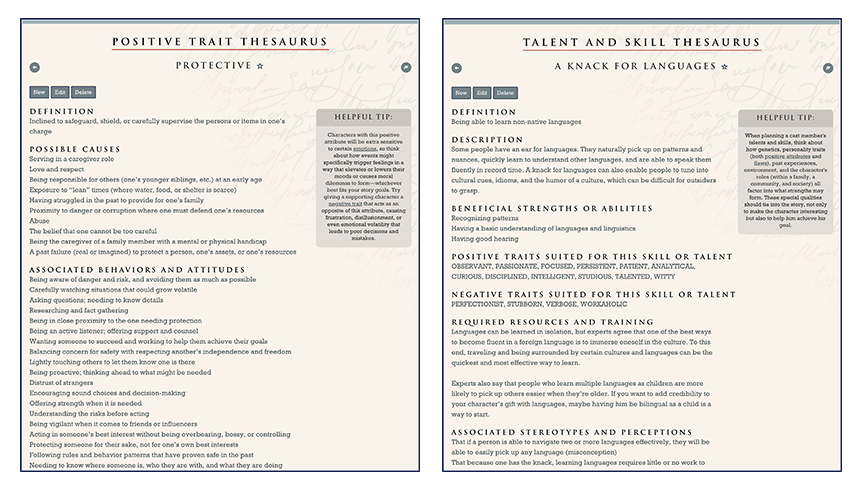
This hyper-intelligent tool integrates One Stop’s extensive thesaurus collection, idea generators, and other resources, allowing you to build deeply layered characters in a fraction of the time. Whether you’re a plotter or a pantser, you can use the Character Builder to
- Explore a character’s backstory, personality, behavior, motivations, physical features, and more
- Gain stronger characterization-building skills through a comprehensive set of tutorials
- Build a personalized character arc blueprint that outlines how the character’s difficult history will present challenges on the path to their goal and defines the growth they must attain to achieve success
- Print profiles or export them to your favorite writing software for easy access
Ready to see this tool in action? Join Becca on a mini-tour of the Character Builder:
Structuring a novel isn’t always easy; in fact, it’s often a hair-pulling venture that can leave writers more confused than ever. Our story maps tool demystifies structure by
- Utilizing the turning points of Michael Hauge’s famous 6-Stage Plot Structure.
- Providing a breakdown of each point so you learn the important elements of story structure as you go.
- Showing the mapping process in action using the film A Few Good Men as an example.
- Allowing you to plot both the outer story events and the internal aspects of character arc (be it a change, static, or failed arc).
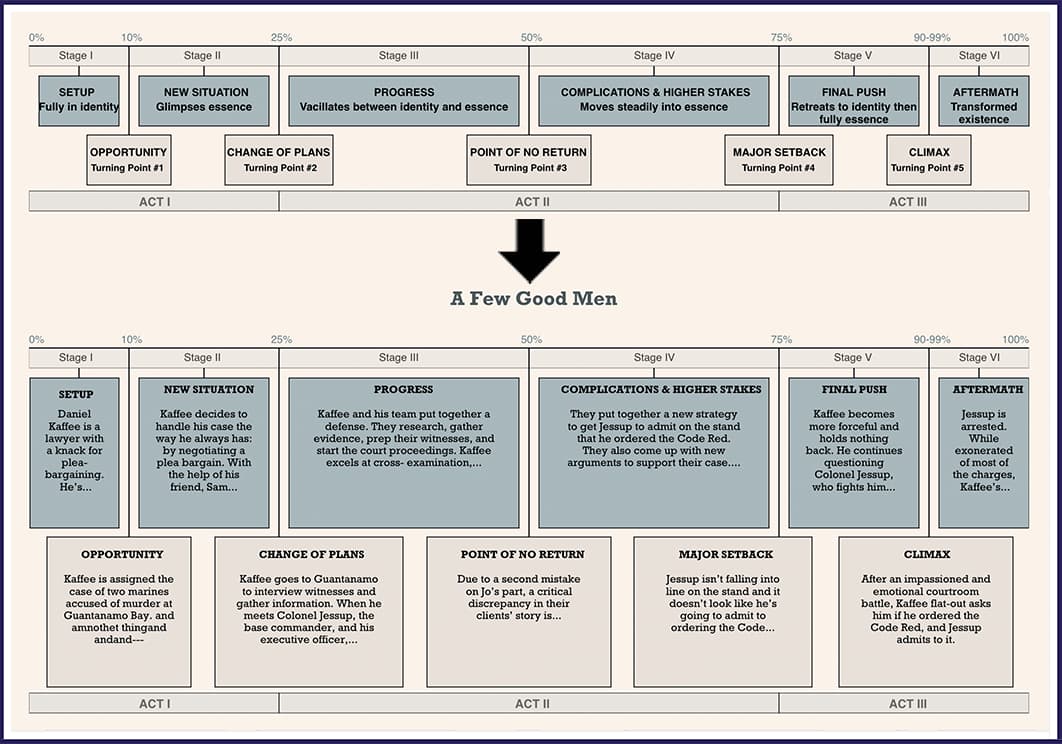
Scene Maps and Timelines
While story maps help with plotting the overall story, scene maps and timelines provide structure at the scene level. As writers have different preferences, we offer a variety of options to suit any planning style.
- Formal Scene Maps: plot important character arc information, such as inner and outer motivation, inner and outer conflict, stakes, and more.
- Informal Scene Maps: pick and choose what to include in each scene from a tailored list of important scene elements.
- Timelines: jot down only the details you wish for each scene and drag the boxes to easily reorder as needed. Plan the scenes of your novel, or use this tool to
- Storyboard plot ideas
- Capture chronological events
- Track a character’s journey across a fantasy world
- Order pivotal battles that influence current events
- Allocate clues to be revealed in a crime novel
- Record a ruling family’s rise to power
- Document friction-inducing miscommunications between characters in a romance
- Or anything else you can dream up!
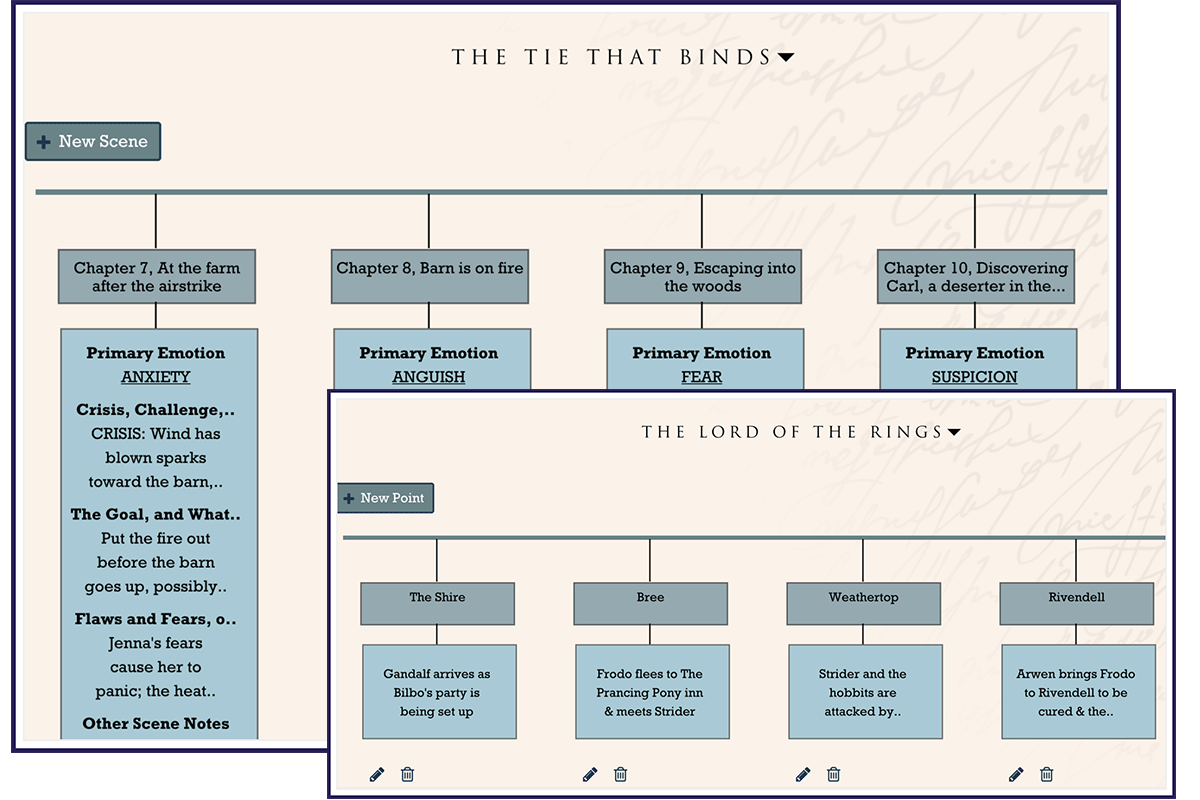
Many elements work together to forge a successful story, and failure can result when any one of them is mishandled. Take the development of your story’s world, for instance. Whether events take place in a real location or one that exists in your imagination, planning is essential for your character’s environment to be fully realized. Our Worldbuilding Tool simplifies this process with a collection of surveys that help writers organize the details. Surveys can be used to build Solar Systems, Human-Inhabited Planets, Alien-Inhabited Planets, Realms, and Cities, Towns, And Villages.
But there’s more to a world than its locations. Once those areas are in place, they’ll need inhabitants—human, animal, and otherworldly—to populate them. To this end, we also have surveys to help with the creation of Creatures And Aliens (both subhuman and intelligent), People, and Groups, Factions, And Organizations, as well as any Sacred Or Magical Objects that may be important to them.
To help out with existing settings, we also have a Real-World Cities, Towns, And Villages survey that can be used for contemporary, historical, dystopian, and urban fantasy and paranormal stories.
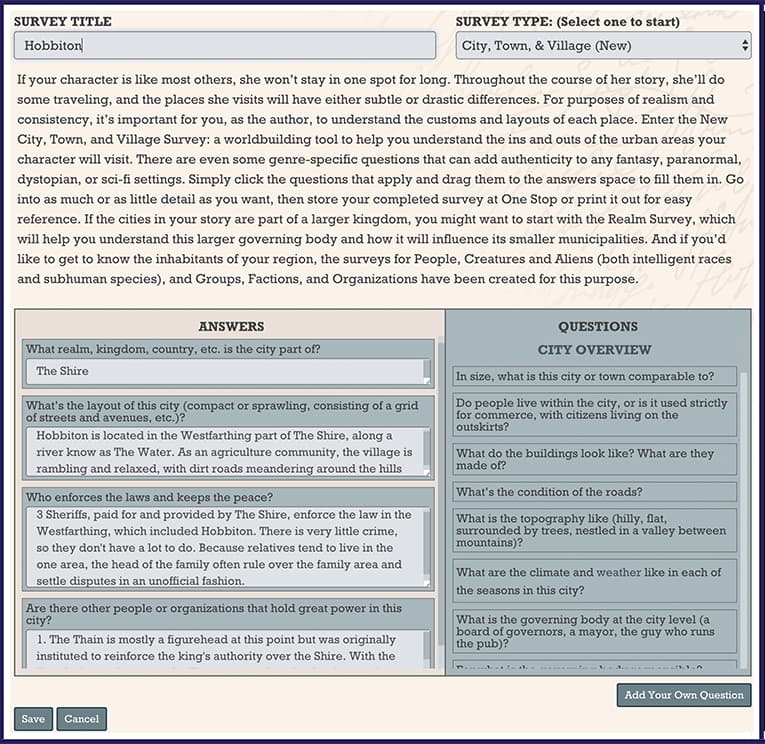
Unlike other generators that spit out clunky story ideas using a random person, place, and thing, One Stop’s generator provides specific suggestions meant to enhance a writer’s individual story. Bookmark promising ideas with a click and access them through My Workspace, your private writing desk at One Stop.
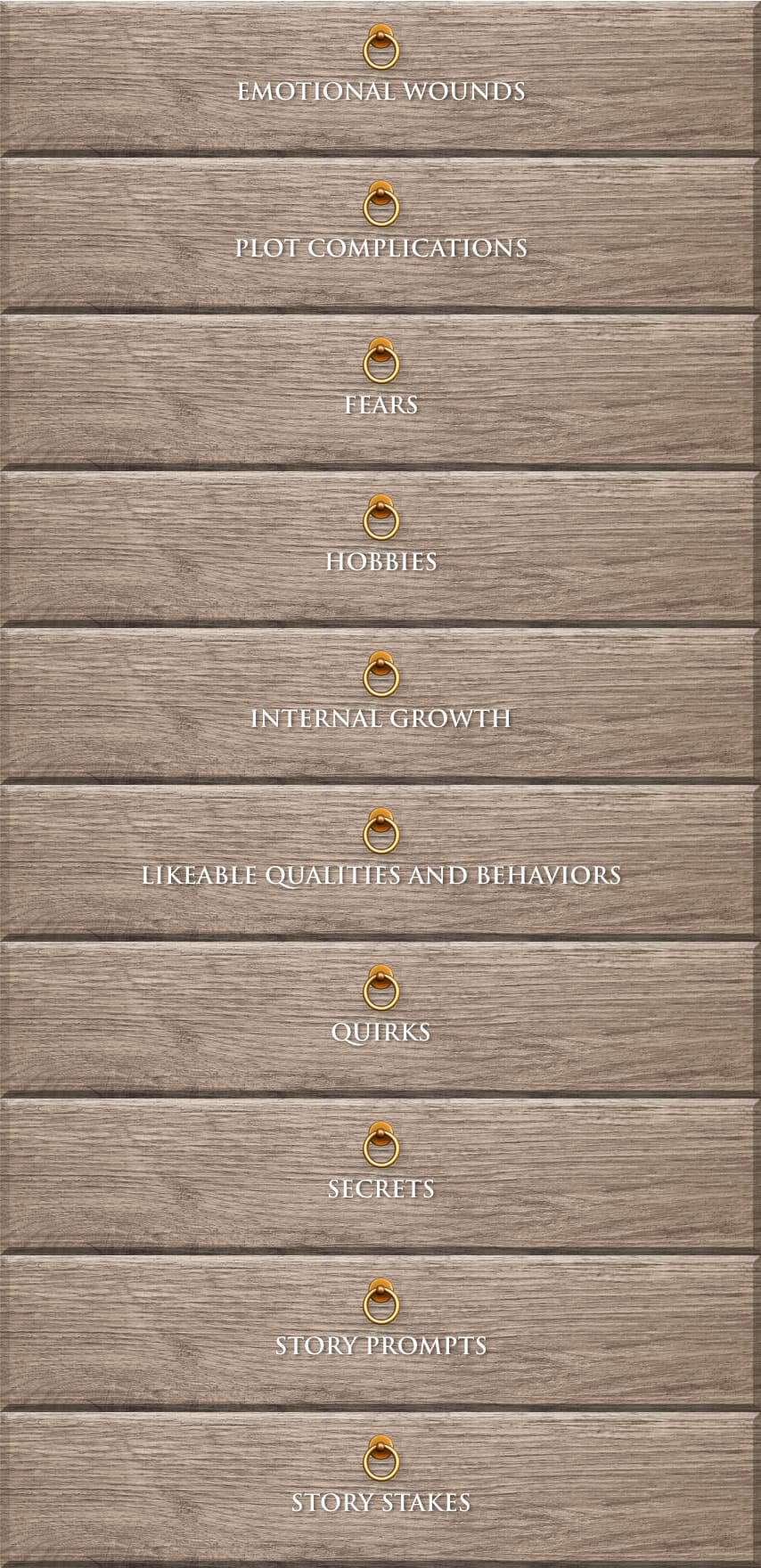
Our custom worksheets and templates can be used to help writers build realistic characters, create settings that resonate with symbolic and emotional meanings, and more.
- Save templates to your computer, then edit and print them at your leisure.
- Fill in worksheets right at One Stop, turning the information into helpful graphics to use as you brainstorm and write.
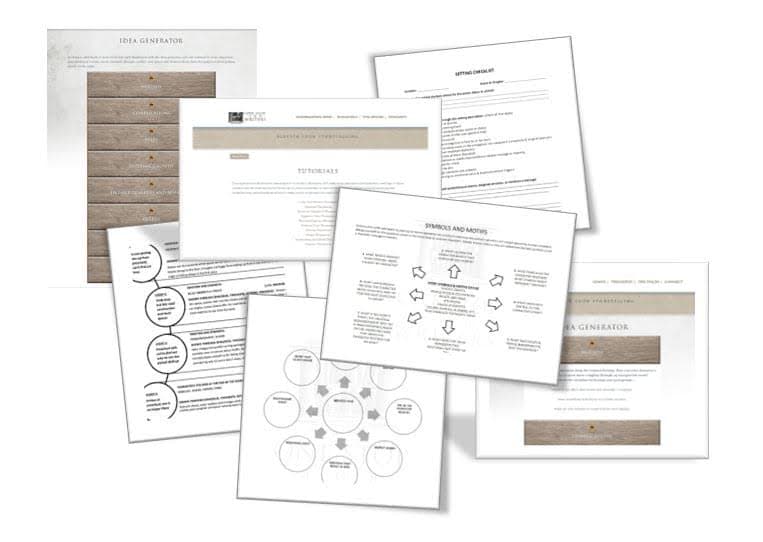
Writers are always looking to grow along their journey and expand their knowledge of the craft. Our tutorials can help bring sophistication and freshness to your prose.
My Workspace
Every writer needs a private workspace! Use yours to
- Store notes, timelines, worksheets, maps, bookmarked generator ideas and thesaurus entries
- Edit your items quickly and easily
- Sort your items by project so you can stay organized—even if you’re working on several novels, stories, poems, or screenplays at once.
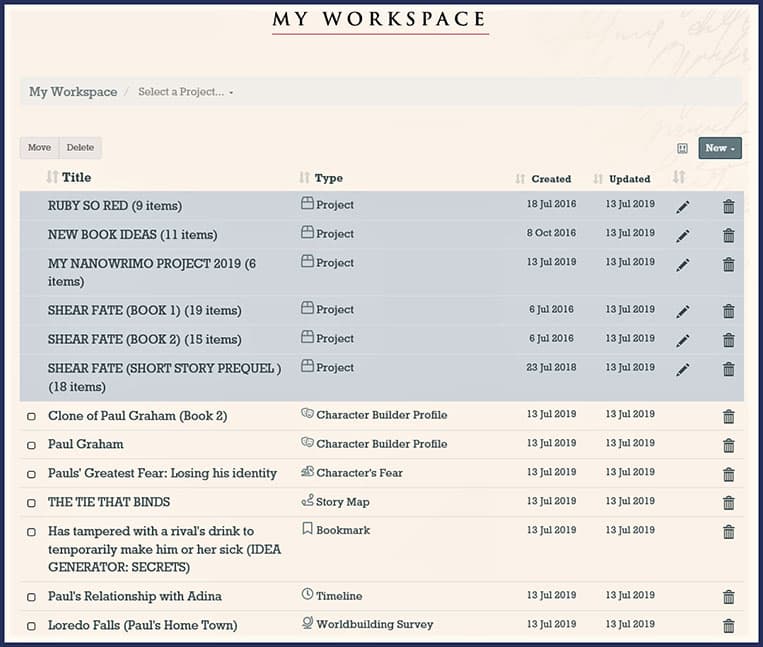
Ready to Test-Drive One Stop For Writers?
Sign up for a two-week free trial to see what the site has to offer. Why not join today? We’d love to help elevate your storytelling!
Testimonial

~ Michael Hauge, Hollywood script consultant, story expert, and best-selling author of Writing Screenplays That Sell and Selling Your Story in 60 Seconds
Read more testimonials here.